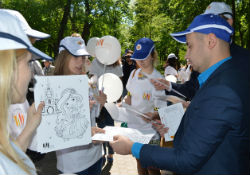European Immunization Week: Republic of Moldova part of the European success in interruption of transmission of rubella and measles viruses

Alexandru Filip/NCPH
A press club dedicated to European Immunization Week (24–30 April 2016) was held on 26 April 2016 in Chisinau, in partnership with the Ministry of Health of the Republic of Moldova, the National Centre for Public Health and the United Nations Children's Fund (UNICEF) Moldova. Discussions with journalists focused on the benefits and cost effectiveness of immunization programmes; adverse reactions and safety; and the importance of immunization throughout the entire life-course, not just in childhood.
"I'm pleased to inform you that 32 countries of the WHO European Region have managed to ensure interruption of transmission of measles and rubella viruses, and the Republic of Moldova is part of that success. As of the end of 2014, the measles virus had been interrupted for 24 months, and the rubella virus for 12 months," mentioned Haris Hajrulahovic, WHO Representative to the Republic of Moldova during the press club. "We will use this opportunity to build alliances and coalitions with representatives of the media, as well as with professionals working in the field, to make sure that every single child in this country has the right to a healthy childhood."
Immunization coverage at 90%
Since implementation of the first vaccines, the Republic of Moldova has achieved good progress in the prevention of infectious diseases such as hepatitis B, polio, diphtheria, tetanus, pertussis, measles, mumps and rubella. The Republic of Moldova has been a polio-free country since 1993 with just 3 cases of tetanus in unvaccinated individuals in the last 10 years. In addition, no indigenous cases of diphtheria have been reported since 2003 and no measles cases and only 4 cases of rubella in the period 2008–2011. Immunization has caused an eightyfold decrease in the rate of mumps and pertussis, and a fortyfold decrease in hepatitis B.
Except for rotavirus and pneumococcus infections, immunization coverage in the Republic of Moldova is around 90% in target population groups.
One of the current priorities of the national authorities is to maintain the polio-free status of the country – e.g. switching from trivalent oral polio vaccine to bivalent oral polio vaccine – and to ensure coverage of new vaccines.
Raising awareness and building alliances
During European Immunization Week, 2 flash mobs assembled in front of the Mother and Child Institute and in the Central Garden. These were organized by young medical specialists from the National Centre for Public Health, and students and residents of the State University of Medicine and Pharmacy "Nicolae Testemitanu", with WHO and UNICEF support.
"The flash mob at the Institute of Mother and Child targeted young mothers and future parents, who should understand the beneficial role of immunization in child development and the importance of their involvement in promoting vaccination," explained Alexei Ceban, Medical Epidemiologist at the National Centre for Public Health.
At the initiative of students from the State University of Medicine and Pharmacy "Nicolae Testemitanu", the first public debates entitled "Yes or No to Vaccination" were held on the premises of the Scientific Medical Library at the Republican Clinical Hospital. Opposing teams (yes and no) presented arguments and relevant data about vaccines and immunizations. Following discussions, audience members were invited to question experts in the field.
The scale of the awareness campaign was extended through channels such as social media, counterparts' web pages and public competitions. WHO provided support for the production and distribution of leaflets for the general population; a series of 4 posters on immunization; T-shirts, caps, balloons and pens bearing the European Immunization Week logo; children's colouring sheets; and growth charts showing a vaccination calendar.



